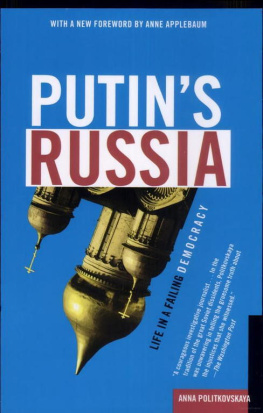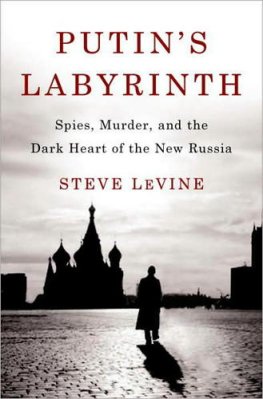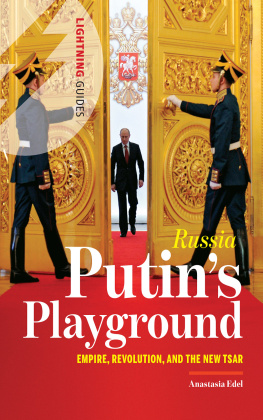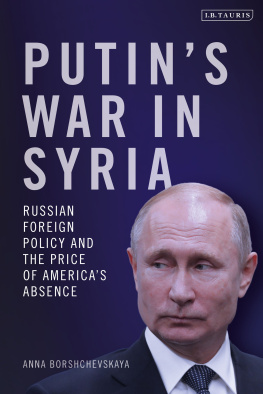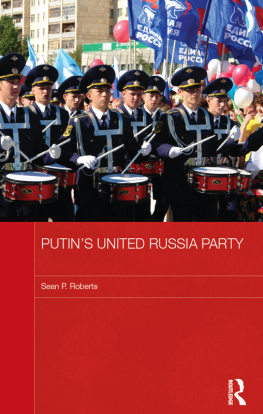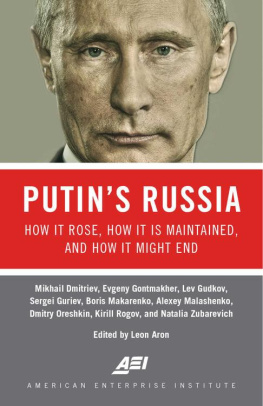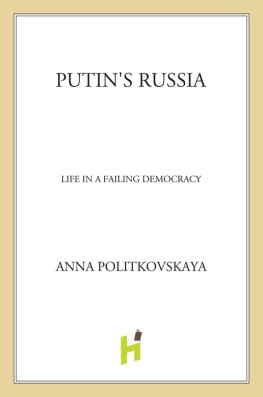Anna Politkovskaya - Putins Russia
Here you can read online Anna Politkovskaya - Putins Russia full text of the book (entire story) in english for free. Download pdf and epub, get meaning, cover and reviews about this ebook. year: 2004, publisher: Holt Paperbacks, genre: Detective and thriller. Description of the work, (preface) as well as reviews are available. Best literature library LitArk.com created for fans of good reading and offers a wide selection of genres:
Romance novel
Science fiction
Adventure
Detective
Science
History
Home and family
Prose
Art
Politics
Computer
Non-fiction
Religion
Business
Children
Humor
Choose a favorite category and find really read worthwhile books. Enjoy immersion in the world of imagination, feel the emotions of the characters or learn something new for yourself, make an fascinating discovery.
- Book:Putins Russia
- Author:
- Publisher:Holt Paperbacks
- Genre:
- Year:2004
- Rating:5 / 5
- Favourites:Add to favourites
- Your mark:
- 100
- 1
- 2
- 3
- 4
- 5
Putins Russia: summary, description and annotation
We offer to read an annotation, description, summary or preface (depends on what the author of the book "Putins Russia" wrote himself). If you haven't found the necessary information about the book — write in the comments, we will try to find it.
Putins Russia — read online for free the complete book (whole text) full work
Below is the text of the book, divided by pages. System saving the place of the last page read, allows you to conveniently read the book "Putins Russia" online for free, without having to search again every time where you left off. Put a bookmark, and you can go to the page where you finished reading at any time.
Font size:
Interval:
Bookmark:
NOTES
The story of the fifty-four soldiers received extensive publicity, with the result that an official inquiry was held under the auspices of the chief military prosecutors office. The investigation found that while in their training of the soldiers the officers had exceeded their authority, the soldiers misconduct on the training ground had provoked the officers into losing their tempers. The case did not come to court, and none of the officers received a criminal sentence. The soldiers were dispersed to different units to prevent them from causing further trouble. This judgment of Solomon was produced by a legal system specifically for those in the armed forces. Such cases are investigated by military prosecutors and passed on to military courts. The prosecutors and the military judges are themselves members of the armed forces who have sworn an oath of loyalty and are subordinate to their superiors, and so on right up to the minister of defense. Accordingly, at every level, prosecutors and judges cannot be independent in their judgments.
This incident was handled in much the same way as the case of the fifty-four soldiers. An inquiry was held by the garrison prosecutors office, whose employees were effectively subordinate to the commanding officer of the military unit in which the incident occurred. Again the prosecutors office acquitted the officers. The illegal sale and renting out of soldiers as inexpensive laborers, usually by their junior officers and in order to carry out particular agricultural or building tasks, is common practice in Russia. Payment usually goes to the officers for their role in the deal. It is extremely rare for the soldiers to be paid other than in food, cigarettes, and overnight accommodations. Occasionally no payment is involved. If the officer and the employer are decent people, the soldiers may be moved out of their units for a time simply because they can be more adequately fed away from the army.
Aslan Maskhadov was the leader of the Chechen resistance forces in the current Chechen war. In 1997 he was elected president of the Chechen Republic of Ichkeria, his legitimacy recognized both by the Kremlin and by the Organization for Security and Cooperation in Europe, which sent observers to the elections. In 1999, however, Putin declared Maskhadov to be de facto deposed. Maskhadov responded by heading up the resistance to the occupation of Chechnya by federal troops. He remained on Russias most-wanted list and was assassinated in March 2005.
Islam Hasuhanov is married to Maskhadovs niece. He was renowned in Russia as a submarine officer, having served on one of the navys elite missile cruisers. On completing his service contract, he was honorably discharged and worked for the Ministry of Defense of Chechnya during the period when Maskhadov was internationally recognized as the legitimate president. The situation did not save Hasuhanov from being sentenced to twelve years in prisonin effect, for working for Maskhadov. As the Supreme Court of the Republic of North Ossetia-Alaniya acknowledged, testimony against Maskhadov was extorted from Hasuhanov during the preliminary investigation by means of barbaric treatment. The record of these court sessions, containing the admission that torture had been used, was subsequently passed to Amnesty International, which continues to work on the case.
The Russian code of criminal procedure provides that the accused have access to an attorney irrespective of ability to pay. During the second Chechen war, however, the law-enforcement agencies began misusing the system to foist on accused persons defense lawyers who, more often than not, were the agencies former employees. Such people are known as insider lawyers. There are also lawyers who work with the FSB and so have a better understanding of its needs than of the individuals they are supposed to be defending. The function of such lawyers is to be present on occasions when the law requires the presence of an attorney. FSB officers also appoint insider lawyers to represent suspects the FSB has abducted. The relatives know only that their family member has disappeared. The FSB deliberately hides him, informing the family neither of his whereabouts nor of the charges against him. Often no formal accusation is ever made. The detention of the disappeared person is illegal, but the family is prevented from appointing a defense lawyer for him. Such victims can disappear for weeks or months; in Hasuhanovs case, the period was about six months. Meanwhile, testimony is beaten out of them, as happened in Hasuhanovs case. His family had no idea what had happened to him or where he was. All the law-enforcement and security agencies of the republic denied they were detaining anybody by that name, while in fact he was being tortured by the FSB despite the appointment of a lawyer.
The Red Cross is often unable to carry out its functions because the Russian authorities frequently withhold permission for prison visits.
Abdullah Hamzaev died in Moscow in June 2004 after a serious illness. During the Budanov trial he was subjected to extreme pressure for speaking out against the accused and all he stood for. Hamzaev was threatened with retribution, and members of his family were intimidated both by Russian nationalists from extremist paramilitary groups and by officers who were colleagues of Budanov. He had several heart attacks in the course of the trial and was taken to the hospital. Once he suffered infarction and clinically died, but later returned to the trial. Hamzaev succeeded in ensuring that Budanov was sentenced to a long term of imprisonment, something few people believed possible in the spring of 2000.
It is important to understand what changed the direction the judicial proceedings were taking, toward justice in accordance with the law. Psychological and psychiatric reports were crucial in the Budanov case. When it became apparent that Budanov might be released from detention right there in the courtroom, the Memorial Civil Rights Center and the director of the Independent Psychiatric Association of Russia, Professor Yury Savenko, sent a request to colleagues in Germany to produce a report for the trial based on the documentary evidence. Simultaneously, lawyers stated in court that they had no confidence in the politically motivated Russian psychiatric experts and demanded that respected foreign psychiatrists be officially invited to contribute to the trial. Despite the fact that the judge refused this demand, the German psychiatrists soon presented their conclusions, which were passed to members of the Bundestag. As a result, the spotlight turned onto the biased reports of the Russian psychiatrists, which were contrasted with the German specialists conclusions. Then Gerhard Schrder brought up the case in conversation with Putin, who, while not much concerned about public opinion in his own country, is highly sensitive to criticism from abroad. Shortly afterward, the trial in Rostov-on-Don dramatically changed direction, which only goes to show, once again, the dependence of the courts on Russias leaders. The state prosecutor who had spoken in favor of Budanov was replaced by one who was unbiased. Lawyers were allowed to call witnesses. The judge agreed to attach to the case file the long report by Dr. Stuart Turner, a fellow of the Royal College of Psychiatrists, in London. For Dr. Turner, Yury Budanov was not the politically sensitive figure he was for us; he was just another patient. Thus it was Western intervention that changed the direction of the Budanov trial.
Rushailo was removed from this post in May 2004, and moved into a new position with little power.
In addition to the pedophilia problem, the prosecutor generals office also held an inquiry into the allegation that Fedulevs wife had given a bribe of $20,000 to Judge Krizsky, and into the closing of the case for which he had interceded. The inquiry found the allegation of thanking to be valid, but no criminal investigation followed. In accordance with Russian tradition, Krizsky was allowed to resign at his own request in order not to cause a scandal. And resign he did, into honorable retirement from the bench. Soon afterward, Prosecutor General Skuratov left office, having provoked a public scandal in which corruption figured prominently.
Next pageFont size:
Interval:
Bookmark:
Similar books «Putins Russia»
Look at similar books to Putins Russia. We have selected literature similar in name and meaning in the hope of providing readers with more options to find new, interesting, not yet read works.
Discussion, reviews of the book Putins Russia and just readers' own opinions. Leave your comments, write what you think about the work, its meaning or the main characters. Specify what exactly you liked and what you didn't like, and why you think so.

